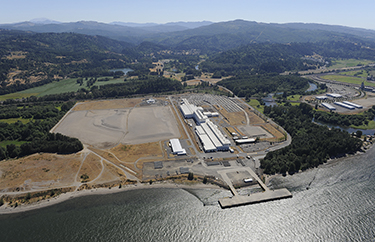|
Subscribe / Renew |
|
|
Contact Us |
|
| ► Subscribe to our Free Weekly Newsletter | |
| home | Welcome, sign in or click here to subscribe. | login |
Environment
| |
 |
September 28, 2017
Kalama methanol plant will fight climate change
Northwest Innovation Works

Zhang
|
Climate change is arguably the most serious existential threat of the 21st century. To address this crisis in ways that will matter, we need to evolve our thinking to develop stringent standards enabling a responsible global view of the way we do business today.
In Washington state, we are fortunate to have some of the best minds in the world focused on this problem. Our culture has always understood the importance of the environment, and we have some of the best regulations in the world to ensure that we live by our values.
People here take responsibility — not just for what happens inside our state’s borders, but for our global environment. Gov. Jay Inslee has been one of the most progressive leaders in the country when it comes to confronting climate change. His leadership has spurred our universities, nonprofits and industry to push the boundaries of innovation to change their practices to minimize our collective impact on the environment, including greenhouse gas emissions.
In this way, we all share the same goal: protecting our environment for generations to come. To deny climate change, or to oppose responsible evolving business practices, is akin to hitting the fast-forward button on diminishing our planet’s ability to sustain life.
In the debate on solutions for fighting climate change, we accept that some people believe the best course of action is to immediately end our reliance on all fossil fuels. If that were achievable today, it might represent a perfect solution. However, at a global level, it would impose profound impacts today that are difficult to imagine: no more computer screens or smartphones; the loss of countless medical devices; no more cars; and no more internet.
The list goes on and on. And, ironically, the quest for perfection stands to block the realization of the good — or the great.
Fighting climate change through activism and engagement must be respected and encouraged. It defies complacency and motivates creativity. But this approach may cause more harm to the environment when conflict overcomes conversation and subsequent industry inaction forestalls solutions.
It’s clear that if human consumption continues, then the solutions must come from motivated innovation, the environmental community and the marketplace insisting on new technologies and standards that prioritize and respond to the impacts of climate change. We must have both the wisdom and the courage to enable us to accomplish the good — or the great.
Not just another plant
Over three years ago, Northwest Innovation Works signed a lease with the Port of Kalama to build a methanol plant on a long-standing industrial site. In so doing, we set out to do much more than just build another plant or create jobs. Our mission is to dramatically change an industry through innovation and, as a result, positively and meaningfully impact our global environment.
Washington state’s innovative spirit and support for taking bold steps that change the world are several of the reasons Northwest Innovation Works chose to locate here.
Methanol is not overly complex or dangerous, but it is necessary. It’s a naturally occurring, biodegradable and noncarcinogenic alcohol that is present throughout our environment. In fact, methanol is ubiquitous in today’s society and is used as a building block in virtually every consumer product today.
Methanol is even used in wastewater treatment plants in Washington and across the globe to reduce environmentally damaging effluent. It falls into that category of things that you don’t even realize you need, but without it, you’d notice a significant change in your daily life.
Most of the methanol produced in the world today comes from China, where many use coal and outdated manufacturing techniques. This dirty and antiquated combination has contributed to both an air quality crisis that is impacting the globe at an alarming rate and significant global greenhouse gas emissions.
In China, air pollution from the use of coal for industrial purposes results in 1.6 million people dying prematurely every year — that’s more than 4,000 people every day. And as you would expect, this is not a problem that respects borders. National Public Radio reported recently that air pollution from Asia had increased harmful surface-level smog in the western United States by nearly 65 percent in recent years. This is on top of significant greenhouse gas emissions that impact the global atmosphere.
We set out to create a pathway to correct these trends. Internally, our goal was to leapfrog the existing industry best practices. We did so by adopting the world’s first-ever large-scale implementation of ultra-low emissions technology at our facility. Through the use of this innovative clean technology, we will reduce global greenhouse gas emissions by up to 90 percent compared to most other methanol facilities in production today.
By replacing China coal with clean ultra-low emissions methanol made in Kalama, annual net greenhouse gas reduction totals more than 10 million tons, which is equivalent to removing more than 2 million cars off the road. That represents a significant and much-needed step in the right direction.
We are also the first large manufacturing facility on the Columbia River to employ a zero-liquid-discharge system, which keeps wastewater out of the river.
Imagine what that means to the Columbia River and its wildlife should more industrial facilities along the river adopt the same approach. Protecting our local waterways and the aquatic life that depends on it is, quite simply, a moral imperative.
But we didn’t stop there.
We are the first large industrial facility to voluntarily support the state’s efforts to impose new “clean air rule” standards that will require us to reduce greenhouse gas emissions from our facility on an annual basis. Just doing better today is not enough, however. We strive to drive improvement every year that we’re in operation.
In addition to protecting our environment, it is essential we help our local, state and national economies thrive. Along with enhancing our local communities’ economy through job creation, taxes and local spending, we are helping local citizens with barriers to employment to gain the skills necessary to improve their quality of life.
We are partnering with former Washington Gov. Gary Locke (who chairs our Global Advisory Board), Lower Columbia College and Workforce Southwest Washington to create a training program for employees who would otherwise fall short of such opportunities. Under this program, we will select 20 individuals to receive scholarships to Lower Columbia College.
The education program will provide scholarship recipients with the skills necessary to work in our facility. Additionally, they will receive minimum wage pay while they are attending college in preparation for family-wage employment at Northwest Innovation Works.
Taking care of our environment and helping our economy to thrive is not an either-or proposition. These fundamental goals must be integrated to ensure healthy communities and a healthy planet for current and future generations. Through the spirit of innovation and responsibility that Washington is known for, together we will help our state, nation and world to thrive now and well into the future.
Simon Zhang is CEO at Northwest Innovation Works. He has over 20 years of experience managing complex energy and industrial projects around the world.
Other Stories:
- Working around an unworkable Voluntary Cleanup Program
- Survey: Golder Associates
- Survey: Farallon Consulting
- Survey: Herrera Environmental Consultants
- Survey: Aspect Consulting
- Fish barrier fix: Take a cue from Henry Ford
- Is Seattle’s Living Building Pilot Program ready to take off?
- Water for rural development: tapping the Hirst ruling
- Going below the surface for better watershed health
- 30 years and beyond: caring for landfills post closure
- Survey: Environmental Science Associates



